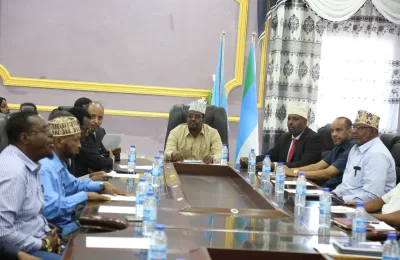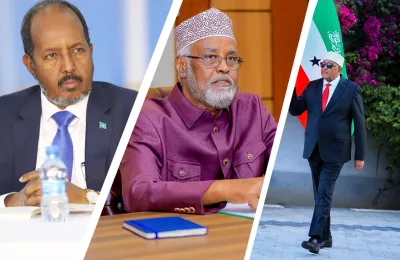A book titled Suomen somalit – Finnish Somalis – has been launched in Finland on Monday…

A book titled Suomen somalit – Finnish Somalis – has been launched in Finland on Monday May 25th. The book gives an overview about the Somali community’s experiences of living in Finland. It is the first ever book of its kind in Finland. Somali speakers in Finland are the fourth biggest linguistic minority with population of about 16 000.
The authors of the book Yusuf M. Mubarak, Eva Nilsson and Niklas Saxén have interviewed nearly 100 people for the book. About 75 of them were members of the Somali community. They come from different backgrounds, different ages and are both men and women. The interviewees came to Finland in different decades since the 1970s. The other 20 people have been researchers and officials who worked with Somalis in Finland including Finnish Immigration Office researchers.
The issues raised in the book range from a historical overview to experiences of daily life in terms of school, jobs, the practice of religion, relations with the media and hopes for the future. The authors emphasize in the book that ”interviewers strongly raised that, fingers in the same hand are different” which means that generalize is not the right means of promoting living together while at the same time some commonalities can nevertheless be seen among the people in the community.
Three main Finnish Somali life stories
First Somalis in Finland: Clearly different starting points have especially been seen among those who have arrived in the country in 90s as the first war refugees, compared to those who have arrived in Finland in 2000s after living a long time in Somalia’s war thorn society, and those young people who have been born and have grown Finland. Still they all share many similar experiences about the Finnish society sphere.
In the book, it is very evident that young people born in Finland have difficulties in finding their true identity. Even though they are born in Finland and have lived in the country all their lives, they do not feel that the society accepts them as Finns in the true meaning. At the same time they do not feel as Somalis either, as they might have never even visited the Somalia.
If I try to be a Finn, I will have a hard time explaining and proving that I am a Finn. It is very frustrating and it tires me. – Fadumo, 28
On the other hand many of the people who arrived in the 90s still hope that they could one day return to Somalia and contribute to their country’s rebuilding. Some have had they suitcases packed and ready to go since 90s, both symbolically and literally.
In addition, many young people that arrived in 2000s or arrive today have lived all their life in war, without education and safety. Some of them who come over Mediterranean see are sarcastically called titanigs, pointing the severity of their travel in the Mediterranean Sea. And when they come to Finland, they have a mountain to climb when they suddenly face all the requirements and restrictions of the Finnish society.
Life in Finland
Many of the interviewed people think their life in Finland is not easy. Many of them have revealed experiences about racism, difficulties in finding jobs, about hardship when trying to learn the rare and difficult Finnish language, or about challenges in making friends with the Finns. The majority population is perceived as quiet and a bit difficult to approach. And Somalis have found it difficult to make necessary business partners with Finns. Finland is not used to multiculturalism, compared to England, Australia or United States etc.
On the brighter side, people are thankful for the peace, rule of law, education system and the services provided by the Finnish welfare state. Free, quality education has given many the opportunities to strive for the professions they dream of, such as becoming medical doctors.
The Finns can learn too
From the multiculturalism viewpoint, Somalis have been the first big community that migrated to Finland. That is why Somalis were strongly doubted and labeled in the beginning. Finland had no knowledge nor prepared to host such a new culture and community in 1990s.
Referring the book: “A boy said he knows that, when he drops junk on the floor, it is all the Somali in Finland who drop it on the floor” this shows the importance that everyone should be careful on what he does and that generalizing is a real”
Eng. Yusuf M. Mubarak living in Finland from 1990s, working for Nokia as telecommunications specialist and one of the authors of the new book, stresses that Finland has also changed a lot during last 25 years. Open racism has become structural but there’s still a lot to do. Mubarak is optimistic, looking forward to the next Somali generation to take their position. His children are studying hard in university, college, high school, and elementary school.
Mr. Mubarak believes that education is the key to share opportunities with the Finnish community and an important proof that you are needed in the Finnish community and your contribution is important. He says if you are a doctor, engineer or teacher your chances to be employed are far better than if you are not so educated. In his view, he encourages next generations to fully educate themselves as researchers, doctors, scientist, engineers and teachers so that the Finnish community has no choice than to hire them.
Finnish media
Mr. Mubarak says that, so far Finnish media has treated the Somali community mainly from the negative viewpoint. With his book, he hopes to give a more accurate picture of the community and about people’s lives. He sees that, there are already some positive reactions widely from the Finnish media towards the book and to the Somali community in Finland.
Mr. Mubarak, who was living in Finland for the last 25 years hopes better future and tolerance between Finns and Somalis. He hopes also that the book will open a dialogue and a discussions on immigration questions and on how to better help new Finns and especially youth to get a place from the Finnish society as an equal citizens. Mubarak also encourages Somalis on other countries and in Diaspora to write books on how they see their new countries, lives, communities they live with and express them self’s to build bridges to better integration and understanding.
Finnish media houses bulletins from the “Finnish Somalis” new book
“Every Finn should read the book about Finnish Somalis” – Aamulehti
“You didn’t know this about Finnish Somalis – Informative book – unfolds the life of the newest minority in Finland” – Helsingin Sanomat
“The long way from Somalia to Finland: Many of Finnish Somalis have lived here a quarter of a century. Only now we got a book about their life here.” – Helsingin Sanomat
“Somalis see Finland as a state of justice – racism still everyday life” –Yle Aamu-tv
“Finnish Somalis yearn for a more open society” –Turun Sanomat
“Young Somali painfully between two languages and two cultures” – Suomenmaa
“It is good for nobody that people come here and be unemployed” – Suomenmaa
“Sarcastic humor and straightness is common with Finns and Somalis” – Yle radio Puhe
Horseed media 2015







